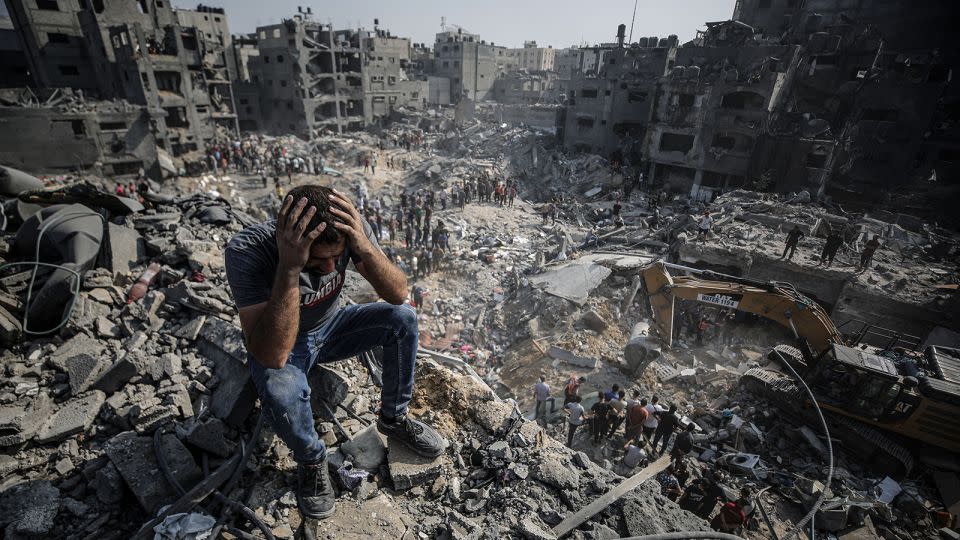US paused shipment of bombs to Israel amid concerns over potential use in Rafah incursion
The United States paused a shipment of bombs to Israel amid concerns over their potential use in a Rafah incursion, Defense Secretary Lloyd Austin confirmed on Wednesday.
Austin said that the US is pausing the shipment of “high-payload munitions” due to Israel’s possible operations in Rafah without a plan for the civilians there.
“We’re going to continue to do what’s necessary to ensure that Israel has the means to defend itself, but that said, we are currently reviewing some near-term security assistance shipments in the context of unfolding events in Rafah,” Austin said at a Senate Appropriations Defense Subcommittee hearing.
“We’ve been very clear … that Israel shouldn’t launch a major attack into Rafah without accounting for and protecting the civilians that are in that battlespace,” said Austin, “and, again, as we have assessed the situation, we’ve paused one shipment of high-payload munitions.”
The decision to pause the shipment appears to send a strong message to Israeli Prime Minister Benjamin Netanyahu who has warned for weeks that an invasion of the southern Gaza city of Rafah will occur at some point in the future, even as the US and others have publicly stated that such a ground operation should not occur. The Biden administration has called for a comprehensive plan to protect more than a million civilians sheltering in Rafah and avoid an expansion of the humanitarian catastrophe unfolding in the coastal enclave.
Israeli officials privately expressed to US officials “deep frustration” on the pause in shipments as well as the US media briefings on the decision, according to a source briefed on the matter.
The officials raised concerns “that the move may jeopardize the hostage deal negotiations at a critical moment,” the source told CNN. The Israelis also emphasized that US pressure should be directed towards Hamas, the source added.
A US official told CNN on Tuesday that the shipment, which was held back last week, includes 1,800 bombs weighing 2,000 pounds and 1,700 bombs weighing 500 pounds.
“We are especially focused on the end-use of the 2,000-pound bombs and the impact they could have in dense urban settings as we have seen in other parts of Gaza,” the official said.
CNN reported over the weekend that one shipment of ammunition to Israel had been paused, but the reason was unclear.
Austin said that the US has not made “a final determination” about what will happen with the weapons shipment and emphasized that it was not part of the supplemental spending package recently passed by Congress that included lethal aid for Ukraine as well as Israel.
“My final comment is that we are absolutely committed to continuing to support Israel in its right to defend itself,” said Austin.
On Monday, Israel carried out what the US described as a “limited” operation in Rafah, taking over the border crossing with Egypt that is a vital lifeline for humanitarian aid.
“This appears to be a limited operation, but of course, much of that depends on what comes next,” said State Department spokesman Matt Miller on Tuesday. “They have said, I think quite clearly, it’s no secret that they want to conduct a major military operation there. We have made clear that we oppose such an operation.”
The US and Israel have been in regular communication about the Israeli military’s plans to conduct a major ground operation in the southern part of Gaza, but the administration has been clear that the plans are far from ready.
“We’ve seen kind of the concepts, but nothing detailed at this point,” Pentagon press secretary Maj. Gen. Pat Ryder said at a press briefing Monday.
Still, Netanyahu has repeatedly stated that a ground operation in Rafah is necessary to keep the pressure on Hamas to release the remaining hostages and to achieve victory. As Israel’s leadership came closer to a final decision, the US began to review proposed transfers of particular weapons to Israel that might be used in Rafah, the US official said. The process of carrying out the review began in April and led to the pause in shipments of the two types of bombs.
“We have not made a final determination on how to proceed with this shipment,” the official said.
Among the largest conventional weapons in the US arsenal, 2,000 pound bombs can have a devastating impact, especially on a densely populated area such as Gaza. The heavy munitions leave a massive crater and can send deadly shrapnel hundreds of feet from the impact site. A CNN analysis of satellite imagery early in the war found more than 500 impact craters consistent with the use of a one-ton bomb.

Marc Garlasco, a former US defense intelligence analyst and former UN war crimes investigator said in December that the density of Israel’s first month of bombardment in Gaza had “not been seen since Vietnam.”
The US is also reviewing the potential sale or transfer of other munitions, including Joint Direct Attack Munition (JDAM) kits to Israel, the official said. But these transfers are not imminent and would occur in the future, the official added.
The Pentagon would not comment when asked about pauses in shipments, but insisted that none of this changes the US’s commitment to the defense of Israel.
“Our commitment to Israel’s security remains ironclad,” Pentagon deputy press secretary Sabrina Singh said at a briefing Tuesday. “You’ve seen that since October 7. You’ve seen us surge security assistance to Israel. So while I’m not going to comment any further I can tell you that our commitments to Israel’s security remains the same.”
CNN’s Jennifer Hansler, Kylie Atwood and Michael Conte contributed to this report.
For more CNN news and newsletters create an account at CNN.com

 Yahoo News
Yahoo News 
